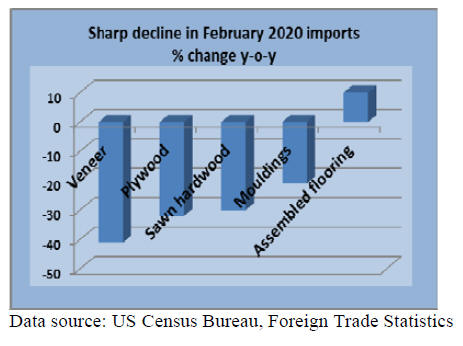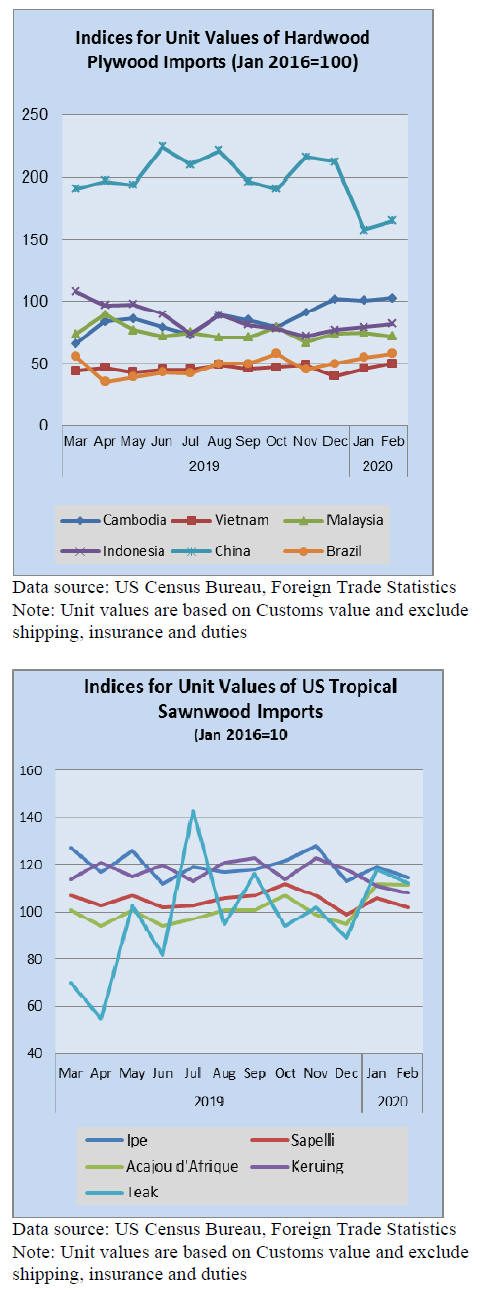|
Report from
North America
Impact of pandemic to linger into 2021
There are projections that it could take up to three years
for the US economy to recover from the corona virus
pandemic according to a review of a McKinsey &
Company report by Matthew Pelkki, George Clippert
Endowed Chair of Forest Economics at the University of
Arkansas at Monticello¡¯s College of Forestry, Agriculture
and Natural Resources.
Pelkki highlights that the forest products industry is
heavily integrated with the greater economy through
housing, manufacturing, and consumer goods.
Some likely impacts over the next 2-3 years are:
1. Housing starts will fall off, slowing lumber demand and
production in the second half of 2020 and first three
quarters of 2021.
2. Tree planting and other silvicultural operations will be
severely curtailed as immigrant (H2B visa) workers are
restricted in number and those that are available for work
in the USA will be used for critically needed food
production.
3. A likely national and global recession will last at least
through 2020, and may last until the third quarter of 2021,
which will affect demand for consumer goods and
manufacturing of high value products so consumption of
pallets and ties will decline.
4. Home remodeling may actually rise in portions of 2020
and 2021 when stay at home orders are relaxed, thus
helping ease the decline in softwood and hardwood
consumption.
5. Global trade in wood products will likewise be curtailed
until at least mid-2021, with the most severe declines in
the second and third quarters of 2020 lasting through the
first quarter of 2021, and then possibly a slow recovery
that could take as long as 2 years.
See:
http://www.magnoliareporter.com/news_and_business/opinion/article_ddaa6cb8-7938-11ea-b2c5-532a415d891c.html
Survey: Woodworking industry faces challenges but is
optimistic
Most woodworking businesses face major impacts from
the corona virus outbreak but the vast majority are
optimistic about the future after the virus passes and many
are pitching in to help by donating supplies and repurposing
their manufacturing.
Those are some of the findings of a survey conducted by
the Woodworking Network at the end of March. The
survey attracted 562 responses and paints a vivid picture
of what woodworking businesses face and how they are
dealing with the crisis, including how they are helping
health workers to cope.
Nearly three-quarters of respondents to the survey say the
virus outbreak is already having a serious to major impact
on their operations. More than 36% say they are
experiencing a major impact on their business while
almost 36% say it is having a serious but not major
impact. About one-quarter of respondents (23.7%) said the
outbreak is having only a minor impact on their business.
Only 4.1% said the virus is having no impact at all.
Biggest impacts faced by these businesses include
disrupted schedules, loss of business, and disruptions in
supplies. Some 69% of respondents said the outbreak has
resulted in disrupted schedules. More than half (55.1%)
said they already face a loss of business.
Nearly half (46.8%) said they are dealing with disruptions
in their supply chain.
Other significant impacts reported included governmentmandated
shutdowns and canceled orders. Some 39% of
respondents said they are dealing with mandated
shutdowns. More than a third (34.5%) are seeing canceled
orders. Nearly 15% listed other impacts including cash
flow issues, employee hardships, and emotional stress.
Despite those issues, the industry generally has a positive
outlook. Almost two thirds say they see a significant
impact short term, but they expect to recover in the long
term. Fewer than 30% see major negative impacts and
report they are uncertain about long-term prospects. Some
8% said they see no impact at all.
For more see:
https://www.woodworkingnetwork.com/news/woodworkingindustry-news/survey-woodworking-industry-faces-majorimpacts-still-optimistic
All heading lower - February data shows early impact
of pandemic
Import statistics from the US government are shedding
light on the extent to which the global pandemic is having
on the US imports of wood products. February data show
considerable across-the-board declines in imports of
tropical hardwood and hardwood products.
Other data reveals almost 7 million people claimed
unemployment benefits in the second week of April. This
bring the total claims to around 17 million, about 10% of
the labour force. The unemployment rate jumped to 4.4%
in March.
Most economists and industry analysts expect much larger
declines in the future as more states are calling for nonessential
businesses to shut down and individuals to stay
home to contain the spread of the coronavirus.

Tropical hardwood imports
US imports of sawn tropical hardwood fell by 30% in
February to the lowest level in more than 10 years. The
10,116 cubic metres imported was less than half the
amount of February of last year. Imports from Brazil and
Malaysia were both down by 48% in February.
The economic slowdown forced by COVID-19 affected
imports across the board with the volume of most types of
wood dropping between 25% and 55%. Imports of Balsa
rose by 28%, but that came off a January that was the
lowest for Balsa in more than a decade.
Hardwood plywood imports
US imports of hardwood plywood dropped by 32% in
February. The import volume of 160,042 cubic metres was
the lowest in eight years. Imports were down from all
major trading partners with imports from Indonesia falling
by 57%, Malaysia down 49%, and China down 46%.
Tropical veneer imports
US Imports of tropical hardwood veneer saw its slowest
month since September 2016 as imports fell by 41% in
February. Imports from Italy fell by 65%, while imports
from Cameroon and India declined by 60% and 57%
respectively. Year-to-date imports are down by 32%.
Moulding imports
US imports of hardwood moulding fell by 21% in
February and are down 9% from 2019 year-to-date.
Imports from Brazil plunged 82% in February to under
US$160,000 which is by far the weakest level in more
than a decade.
But, assembled flooring imports not affected in
February
US imports of assembled flooring panels fell by 14% in
February yet were still 10% higher than imports of
February 2019. A 29% gain in imports from Canada kept
totals from seeing the declines COVID-19 is bringing to
imports of most other products, at least for now. Year-todate
totals are 3% ahead of 2019.
Imports of hardwood flooring were down by 12% in
February and are behind 2019 year-to-date totals by 25%.
Imports from Brazil fell by 41% and from Indonesia by
20%. Imports from Malaysia and China were up slightly
for the month but are both down more than 50% year-todate.
Planned expansion of Lacey Act
The US Department of Agriculture's Animal and Plant
Health Inspection Service (USDA-APHIS) has announced
that a sixth round of products will be added to the Lacey
Act enforcement schedule and therefore will require a
Lacey Act declaration upon importation.
Within Chapter 44 of the Harmonised Tariff Schedule of
the United States which covers wood products, Phase VI
includes Oriented Strand Board (441012) as well as cases,
boxes, crates, drums, containers, pallets, box-pallets, etc.
(4415). Additionally, Phase VI includes several Essential
Oils, Trunks and Suitcases, and Musical
Instruments. Phase VI is scheduled to go into effect
October 1, 2020.
See:
https://www.federalregister.gov/documents/2020/03/31/2020-06695/implementation-of-revised-lacey-act-provisions

|